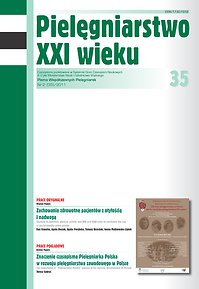Knowledge and quality of life of adolescents suffering from inflammatory bowel disease
Keywords:
inflammatory bowel disease, quality of life, adolescentAbstract
Introduction. Inflammatory bowel disease is undeniable big psychical burden for a sick adolescent. The whole picture of disease, prognosis, and the diagnostic and therapeutic procedures significantly affected the quality of life in physical, emotional and social aspects.
Aim. The aim of the study was to recognize the quality of life and the level of knowledge of adolescents with inflammatory bowel disease.
Material and methods. Research group comprised 32 patients and their 26 parents.The control group comprised 37 pupils from Secondary School No.6. The methods used in the analysis were: quality of life questionnaire-PEDS QL, “Cantrill Ledder”. The obtained results were statistically analyzed.
The results. Adolescents posses sufficient knowledge about their disease and positively assess their quality of life.
Conclusions. The adequate knowledge about the disease may guarantee having the control over one`s own health and having better life quality in the future.
References
1. Bartnik W.: Wytyczne postępowania w nieswoistych chorobach zapalnych jelit. Przegląd Gastroenterologiczny 2007; 2(5), 215-225.
2. Pecyna M.B.: Dziecko i jego choroba. Wydawnictwo Akademickie, Żak. Warszawa 2000.
3. Zalewski T.: Choroby przewodu pokarmowego u dzieci. Wydawnictwo Lekarskie PZWL. Warszaw 1995.
4. Iwańczak F.: Gastroenterologia dziecięca. Wybrane zagadnienia. Wydawnictwo Medyczne Borgis. Warszawa 2003.
5. Pilecka W.: Przewlekła choroba somatyczna w życiu i rozwoju dziecka. Problemy psychologiczne. Wydawnictwo Uniwersytetu Jagiellońskiego. Kraków 2002.
6. Europejskie stanowisko oparte na danych naukowych dotyczące postępowania w chorobie Crohna. Medycyna Praktyczna- wydanie specjalne 7/2007.
7. Belling R. McLaren S., Woods L.: Specialist nursing interventions for inflammatory bowel disease (Review). The Cochrane Library 2009/4. John Wiley and Sons Ltd. 2009.
8. Romańczuk W., Ryżko J.: Nieswoiste zapalenia jelit u dzieci i młodzieży. Acta Endoscopica Polonia 1999; 9; 11-16.
9. Cepuch G., Dębska G., Perek M. Ocena zależności pomiędzy natężeniem bólu a satysfakcja z życia młodzieży hospitalizowanej z powodu choroby Leśniowskiego-Crohna. Pielęgniarstwo Polskie 2001. 2(12); 219-226.
10. Taylor R.M., Gibson F., Franck L.S.: The experience of living with a chronic illness during adolescence: a critical review of the literature. Journal of Clinical Nursing 2008;17.
11. Taylor R.M., Gibson F., Franck L.S: A koncept analysis of health-related guality of life in Young pe ople with chronic ollness. Journal of Clinical Nursing 2008;17.
12. Marcus S.B., Strople J.A. Neighbors K. (wsp.): Fatique and health- related quality of life in pediatric inflammatory bowel disease. Clinical Gastroenterology and Hepatology 2009; 7; 554-561.
13. Varni J.K., Burwinkle T.M., Katz E.R.: The PEDS QL in pediatric cancer: reliability and validity of the pediatric quality of life inventory generic core scales, multidimensional fatique scale and cancer module. Cancer 2002; 94.
14. Gold N., Issenman R., Roberts J. Well-adjusted children: an alternate view of children witch inflammatory bowel disease and functional gastrointestinal complains. Inflammatory Bowel Disease 2000;6.
Downloads
Published
Issue
Section
License
Copyright (c) 2011 Authors

This work is licensed under a Creative Commons Attribution 4.0 International License.




